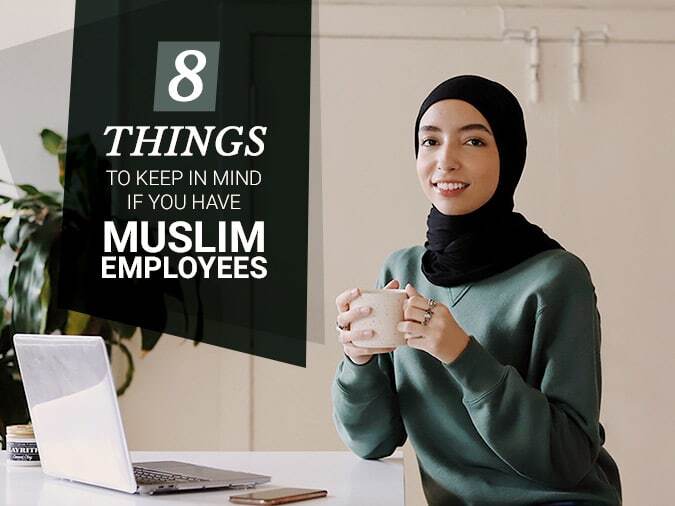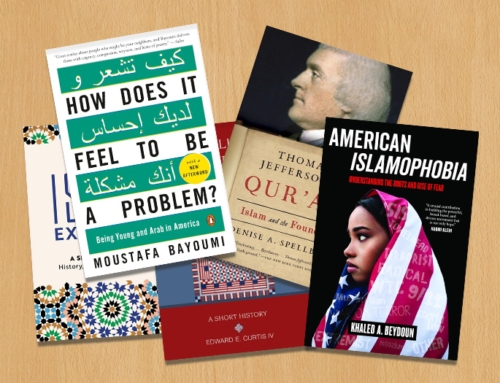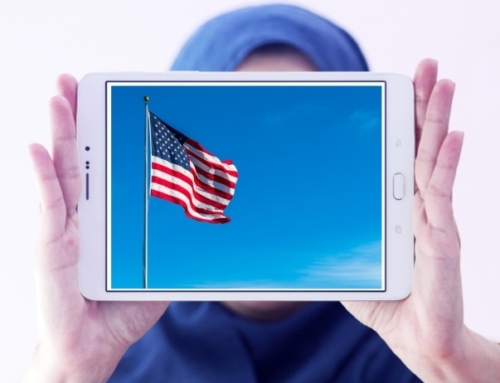By: Laura El Alam
How to Create a Welcoming Workplace for Muslim Employees: 8 Tips
These days most employers strive to make their workplace as inclusive and welcoming as possible. Being culturally sensitive and accommodating for employees is the ethical thing to do, but it is also necessary since religious expressions are protected by the Bill of Rights and federal law.
The First Amendment to the Constitution of the United States protects the free exercise of religion, and Title VII of the 1964 Civil Rights Act provides that an employer may not discriminate against a person because he/she adheres to a particular faith, and that employers must accommodate an employee’s religious practices unless doing so would cause undue hardship to the employer.
Maybe you have some questions about Muslims’ religious requirements.*
Here are the Top 8 Things to Keep in Mind if you have Muslim Employees:
1. Prayer:
Muslims are required to pray five times a day within certain windows of time, and sometimes those windows occur during a workday. It is extremely helpful to offer Muslim employees a small, clean, private area to pray. Prayers take only 10-15 minutes. Islamic prayers require Muslims to perform a quick ritual cleansing (at a sink in a restroom, for instance) and then to stand, bow, kneel, and prostrate with their forehead to the ground. Prayers are quiet and inconspicuous but should not be interrupted by others walking in front of the person who is praying, or speaking to them. When s/he is praying, a Muslim will not answer the phone or engage in conversation. In the case of an emergency, Muslims would end their prayer.
2. Friday Prayer or Jumuah:
On Fridays Muslims observe a congregational prayer at a mosque. This usually happens during the lunch hour and can last 45-90 minutes. Muslims should be allowed to take an extended lunch break on Fridays and make up the missed time either before or after the work day.
3. Dietary Restrictions:
Muslims are not allowed to eat pork, pork byproducts, or alcohol in any form. Some Muslims only eat halal or zabiha products made from meat that has been slaughtered according to Islamic standards. Others will eat meat (like chicken, lamb, or beef) that is not certified halal.
What does this mean for you as an employer? If you wish to provide a comfortable environment for Muslim employees, please keep in mind that Muslims’ dietary restrictions are very important to them. Meeting “over drinks” at a bar is not going to be an option for most Muslims, for instance. A problem arises when a Muslim feels forced to consume something (like alcohol) to keep their job, or pressured to do things (like attend work-related cocktail parties) that compromise their faith.
4. Dress Code:
Muslims who follow a traditional interpretation of Islam will take their dress code very seriously. This will be most noticeable in Muslims women, who are required to cover their hair and wear loose, modest clothing. One thing to keep in mind is that a headscarf (or hijab, as some people call it) does not impede a Muslim woman from doing her job with excellence.
All around the world, Muslim women perform complex tasks while modestly dressed, from performing surgery to completing triathlons. If your workplace has a uniform, and a Muslim employee asks to alter it to meet modesty requirements, please collaborate with her to make it work.
Muslim men are required to dress and act modestly, too. Many wear a beard for religious reasons. Some wear a small cap called a kufi.
5. Gender Relations:
Muslims have strict guidelines on interactions with the opposite sex. Fortunately, an appropriate, professional workplace environment would preclude most problems. In Islam, interactions between men and women who are not closely related are supposed to be strictly professional. Flirting, suggestive banter, and physical contact are not allowed. Most Muslim men and women prefer not to hug or shake hands with members of the opposite sex.
6. Holidays:
Muslims do not celebrate Christian or Jewish religious holidays like Christmas, Hanukkah, or Easter. Many do observe secular holidays like Thanksgiving.
Eid: the two main Islamic holidays are called Eid (day of festivity). Eid al Fitr marks the end of Ramadan, and Eid al Adha coincides with the yearly pilgrimage to Mecca. The Islamic calendar is lunar and does not align with the solar calendar; while it also has 12 months, it is about 11 days shorter. Therefore, Islamic holidays fall on different days each year. It can be difficult for Muslims to pinpoint the exact day of their holiday until it is imminent. Because of differences in interpretation, Muslims around the world sometimes end up celebrating Eid al Fitr on 2 or even 3 different days. As an employer, your understanding and flexibility around Muslims holidays would be appreciated. Celebrating Eid requires that Muslims take one day off twice every year. It is an important religious celebration and there should be no penalty.
Ramadan: the month of Ramadan is a sacred month for Muslims. Adults abstain from food and water from dawn until sunset for the entire month, with exceptions made for people who are ill, pregnant, traveling, menstruating, or breastfeeding. Because Muslims might have valid personal reasons not to fast, it is impolite to ask them why they’re not fasting, if you observe them eating during Ramadan.
Muslims are used to working during Ramadan and will most likely carry out their responsibilities as usual. If their tasks are extremely physically demanding, they might need accommodations.
It is very important to Muslims to break their fast as soon as the sun sets. If their work hours coincide with sunset, please allow them to take a break during that time.
7. Inclusion:
Everyone wants to feel like a valued and respected member of the team, not like an outsider. For Muslims (or anyone) to feel included, it is important to keep a few things in mind:
- Learn how to pronounce their name properly. Please do not give someone a nickname unless they request it. Don’t hesitate to ask them how to pronounce their name and write it down phonetically so you can practice it.
- Discourage any workplace conversation that makes them feel “othered,” like comments about the food they bring or the clothes they wear.
- Have a zero tolerance policy in the workplace for racist or discriminatory remarks. Every employee who works for you should know the repercussions of using inflammatory or bigoted language.
8. Financial Matters:
Muslims try to avoid paying or charging interest. Many also want to avoid investing in stocks whose company policies contradict Islam. Please be willing to listen to the employee’s concerns, if any, about the way their retirement funds are invested.
*Like followers of any other religion, Muslims vary in their practice of their faith. You might find two Muslims doing two different things, based on their interpretation of Islamic rules, or their adherence to the tenets of their faith. These guidelines are meant to help you support Muslim employees who request certain accommodations.
Raised in a Midwestern Catholic family, Laura El Alam became a Muslim in 2000. She is a prolific writer whose work has been published in various magazines. Laura is the founder of Sea Glass Writing & Editing www.seaglasswritingandediting.com and runs the Facebook page The Common Sense Convert which aims to provide a beneficial online forum for Muslim women.
Got Questions?
We have Answers. Get in touch now.








